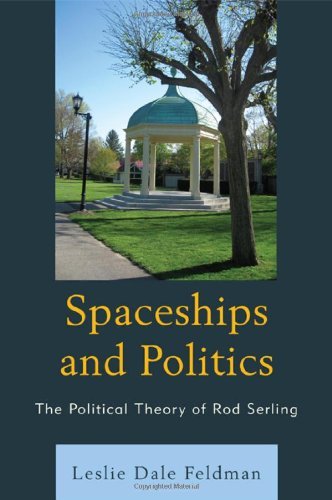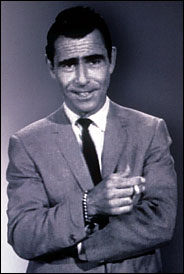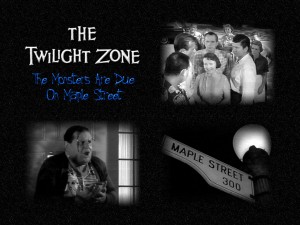 I am always on the lookout for good books that probe various aspects of the fantastic in popular culture in depth. Not long ago I came across such a book that looked at the political views of Rod Serling as expressed in his television show The Twilight Zone. The book is Spaceships and Politics: The Political Theory of Rod Serling (Lexington Books, 2010), by Leslie Dale Feldman. Feldman is a Professor of Political Science at Hofstra University, and was willing to discuss her book.
I am always on the lookout for good books that probe various aspects of the fantastic in popular culture in depth. Not long ago I came across such a book that looked at the political views of Rod Serling as expressed in his television show The Twilight Zone. The book is Spaceships and Politics: The Political Theory of Rod Serling (Lexington Books, 2010), by Leslie Dale Feldman. Feldman is a Professor of Political Science at Hofstra University, and was willing to discuss her book.
TheoFantastique: Leslie, thank you for the opportunity to take a look at your book, and for participating in this interview. How did someone with an academic background in political science come to connect this to The Twilight Zone?
Leslie Dale Feldman: Good question, John. As I was teaching my political theory classes I realized I kept using examples from The Twilight Zone. I would always say “there’s a Twilight Zone like this” in teaching about themes like dictatorship, conformity, technology, etc. One day I said “I should write a book on this” and one of the students said “you should do it” So I did.
TheoFantastique: Can you summarize the thesis you unfold in your book regarding Hobbesian political theory, and how you connect this to Rod Serling’s political explorations in The Twilight Zone?
Leslie Dale Feldman: Thomas Hobbes, English political philosopher of the 17th century, focused on a negative view of human nature, how humans, during a time before government to control them, would be “belligerent, nasty, competitive, and acquisitive” I see this view reflected in The Twilight Zone in such episodes as “The Shelter” (where neighbors compete for refuge in a shelter) and “The Monsters are Due on Maple Street” where neighbors turn on each other when they think one of them is an alien. But The Twilight Zone also has optimistic shows with children and magic.
TheoFantastique: In your research into Serling what types of things did you come across perhaps in his education, speeches, or interviews that shed light on his political views?
 Leslie Dale Feldman: He was a Democrat with a strong sense of social commitment and justice. Most of all, he hated nuclear war which he felt was the worst part of “modernity” and fascism which he fought against in WWII. This is reflected in such Twilight Zone shows as “The Shelter” and “Time Enough at Last” with Burgess Meredith, among others. And there are also several anti-war shows such as “The Quality of Mercy.” Serling belonged to an anti-nuclear group in Hollywood, California.
Leslie Dale Feldman: He was a Democrat with a strong sense of social commitment and justice. Most of all, he hated nuclear war which he felt was the worst part of “modernity” and fascism which he fought against in WWII. This is reflected in such Twilight Zone shows as “The Shelter” and “Time Enough at Last” with Burgess Meredith, among others. And there are also several anti-war shows such as “The Quality of Mercy.” Serling belonged to an anti-nuclear group in Hollywood, California.
TheoFantastique: What were some of the main political themes explored by Serling in The Twilight Zone and which episodes illustrate them?
Leslie Dale Feldman: There are so many:
Dictatorship: “The Mirror,” “It’s A Good Life”
Nuclear War: “Time Enough at Last,” “The Shelter,” “No Time Like the Past”
Individual v. the state: “The Obsolete Man”
Conformity: “Mr. Bevis”
TheoFantastique: Do you have any favorite episodes that touch that special place for you as a political science professor?
Leslie Dale Feldman: I love “A Stop at Willoughby,” about a harried New York advertising guy who wants to escape the “rat race” of modern competition and go back to a bucolic 19th century town he fantasizes about, Willoughby. The gazebo is a symbol featured here, as in No Time Like the Past, to represent the band concerts and community that Serling had experienced in his hometown of Binghamton, NY, and this symbol is featured on the cover of my book Spaceships and Politics: the political theory of Rod Serling. I also like the shows about dictators, the Holocaust and fascism.
TheoFantastique: I still find The Twilight Zone of relevance to our culture and social circumstances today and have even made posts using various episodes for contemporary political commentary. Do any episodes that touch on politics seem worthy of reflection today?
 Leslie Dale Feldman: Absolutely. “The Monsters are Due on Maple Street” looks at fear and how it works in a community among neighbors. This can apply to the Red Scare, the Communist threat of the 1950s, and even today. Neighbors fear each other, and it’s basic human nature not to trust. In a classic Twilight Zone episode, “The Gift,” Serling suggests we should trust more– but then in “To Serve Man” he suggests the opposite! The shows always have something new to offer, even if you’ve seen them– in “I Dream of Genie” a guy who becomes President has a dog as a sidekick that looks like FDR’s dog. I thought that was cute. What about technology? “A Thing about Machines” is about a guy who hates machines– robots, computers and technology are great but have their drawbacks.
Leslie Dale Feldman: Absolutely. “The Monsters are Due on Maple Street” looks at fear and how it works in a community among neighbors. This can apply to the Red Scare, the Communist threat of the 1950s, and even today. Neighbors fear each other, and it’s basic human nature not to trust. In a classic Twilight Zone episode, “The Gift,” Serling suggests we should trust more– but then in “To Serve Man” he suggests the opposite! The shows always have something new to offer, even if you’ve seen them– in “I Dream of Genie” a guy who becomes President has a dog as a sidekick that looks like FDR’s dog. I thought that was cute. What about technology? “A Thing about Machines” is about a guy who hates machines– robots, computers and technology are great but have their drawbacks.
TheoFantastique: Leslie, thank you again for your book, for its exploration of one of the greatest television writers and programs of all time, and for your time to discuss politics and The Twilight Zone.
Leslie Dale Feldman: Thank you!
(Readers interested in exploring Rod Serling and The Twilight Zone in more depth might also enjoy the documentary Rod Serling: Submitted for Your Approval which can be viewed in installments on TheoFantastique’s YouTube page.)
Related post:
“On the Fiftieth Anniversary of The Twilight Zone‘s ‘The Eye of the Beholder'”





There are no responses yet